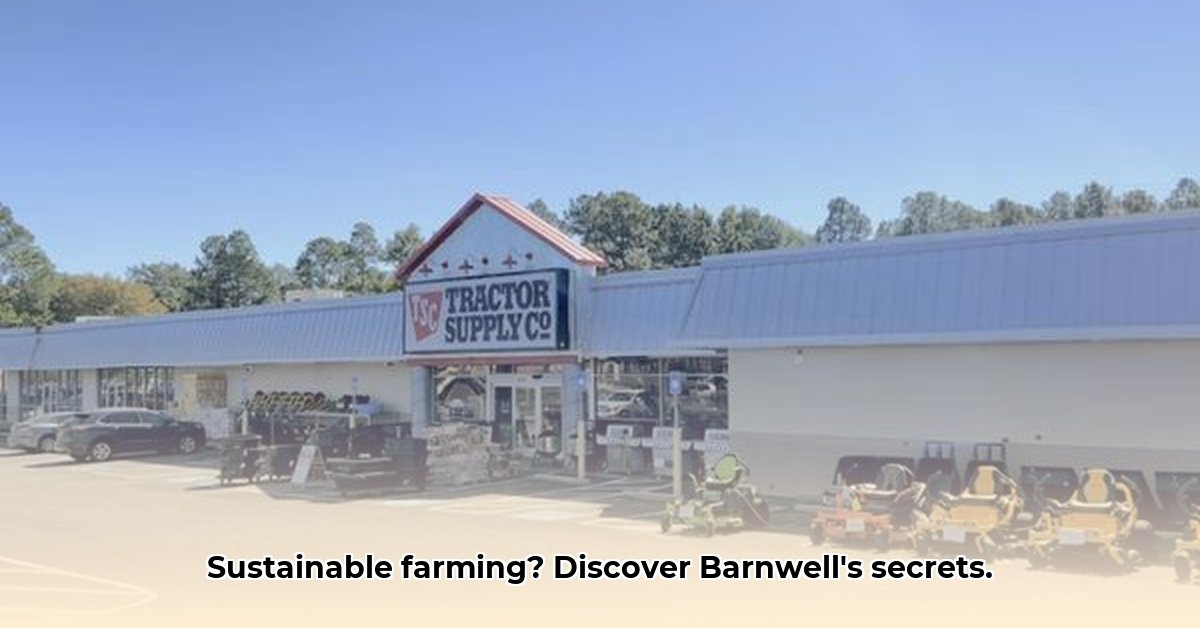
Barnwell Tractor Supply (BTS) serves as a vital hub for local farmers and gardeners, providing essential supplies ranging from seeds and fertilizers to animal feed and fencing. However, its contribution to sustainable farming practices in the Barnwell area requires a nuanced evaluation. While BTS doesn't explicitly promote sustainable agriculture, its role in facilitating access to environmentally conscious products is undeniable. A farmer seeking organic fertilizer, for example, can readily find it at BTS, highlighting the store's indirect support of sustainable choices. For more information on agricultural lime options, check out this helpful resource: Agricultural Lime Info. However, a lack of transparency regarding the environmental impact of BTS's products and supply chain hinders a precise quantification of its contribution. The absence of publicly available data on the percentage of eco-friendly products sold or the store's overall carbon footprint presents a significant challenge in assessing its true impact. This information gap is crucial to address for a complete understanding. How significant is BTS's role in the local agricultural sector, and how does that translate to sustainability?
Understanding Barnwell's agricultural landscape – prevalent crops, livestock types, etc. – is also crucial. The high demand for specific products at BTS reflects local farming practices. For instance, a region heavily involved in cotton farming will likely see a high demand for cotton seeds and related equipment at BTS. Therefore, understanding these local dynamics is vital in evaluating BTS's influence on sustainable practices.
To achieve a more comprehensive assessment, collaborative efforts are essential:
| Stakeholder | Short-Term Actions (0-1 Year) | Long-Term Actions (3-5 Years) |
|---|---|---|
| Local Farmers & Gardeners | Actively seek out sustainable options within BTS's product range; provide direct feedback to BTS regarding product availability. | Advocate for an expanded selection of organic and eco-friendly products at BTS; collaborate on community-based sustainable farming initiatives. |
| BTS Management | Conduct a comprehensive environmental audit of product sourcing and distribution; begin tracking key environmental performance indicators (KPIs). | Publicly release annual sustainability reports, including KPIs such as energy consumption, waste reduction, and sustainable sourcing percentages. |
| Local Community | Support local initiatives focused on ecological sustainability and responsible agriculture. | Partner with BTS on educational programs promoting environmentally conscious farming and gardening practices; advocate for transparent sustainability reporting. |
| Researchers/NGOs | Evaluate BTS’s indirect influence on local sustainability using a combination of quantitative and qualitative data-gathering methods. | Conduct a comprehensive life cycle assessment of BTS’s operations and product supply chain to quantify their environmental impact. |
This collaborative approach fosters transparency and accountability. Farmers can contribute by making informed purchasing decisions and providing feedback. BTS can improve by transparently reporting its environmental impact. The community can support both through education and partnerships. Finally, independent researchers provide objective data for informed decision-making.
Currently, the lack of comprehensive data limits the precise quantification of BTS's impact on sustainable farming. However, the potential for positive contributions is substantial. Continued research, transparency, and collaboration are crucial to fully understand BTS's role in supporting the transition towards sustainable agriculture within the Barnwell community. Future research could focus on correlating BTS product sales with the adoption of sustainable farming practices by local producers. This will provide a more nuanced understanding of the intricate relationship between retailers and the advancement of environmentally responsible agriculture.
How to Measure Tractor Supply's Impact on Sustainable Farming Practices
Three Pivotal Points:
- A comprehensive assessment of Tractor Supply's (TSC) sustainability efforts requires examining both its internal operations and its influence on actual farming practices. Simply improving internal efficiency isn't enough; the impact on the broader agricultural ecosystem needs scrutiny.
- Data transparency is paramount. TSC must publicly share measurable sustainability targets and regularly report on their progress, detailing both successes and challenges.
- Collaboration with farmers, industry experts, and other stakeholders is essential for a holistic and credible assessment. This collaborative approach ensures that the measurement process is both thorough and inclusive.
Assessing TSC’s Operational Sustainability
Measuring TSC's operational sustainability involves analyzing its internal practices. This includes assessing energy consumption, waste reduction rates, and the percentage of sustainable materials used in packaging. The presence of ambitious, measurable targets and transparent reporting on progress are crucial indicators. For example, a 20% reduction in energy consumption over three years demonstrates a commitment to operational improvement. However, strong operational sustainability doesn't automatically equate to positive impacts on farming practices. The link between operational improvements and farm-level sustainability requires further investigation.
Analyzing TSC's Influence on Farmer Practices
Evaluating TSC's influence on sustainable farming practices requires a multifaceted approach. This involves investigating:
- Product Selection: The availability and prominence of environmentally friendly products (e.g., organic fertilizers, water-efficient irrigation equipment) within TSC stores signals a concrete commitment to supporting sustainable farming choices.
- Farmer Education: The provision of educational resources, such as workshops, webinars, or in-store materials on sustainable farming techniques, demonstrates a proactive approach to encouraging the adoption of sustainable practices. Evidence of participation in these programs can offer further insight.
- Supply Chain Transparency: The transparency regarding the sustainability of TSC's supply chain—including supplier standards and practices—indicates the extent to which the company is working to promote sustainability from start to finish.
To gather this information, surveys, interviews and case studies of TSC employees, farmers, and suppliers are vital.
The Crucial Role of Data and Transparency
Without transparent and readily accessible data from TSC, a reliable assessment becomes impossible. TSC must prioritize collecting and reporting data on various aspects of its sustainability initiatives. This includes granular information on its product sourcing, transportation methods, and the overall environmental impact of its operations. The availability of such data strengthens the credibility and influence of the evaluation.
Collaboration: The Pathway to Progress
Sustainable agriculture is a collective effort. Collaboration between TSC, farmers, researchers, policymakers, and other relevant stakeholders is essential. This collaborative approach facilitates a comprehensive understanding of TSC's influence on sustainable farming practices, leading to more effective strategies for improvement and promoting a collective commitment to environmentally responsible agriculture.